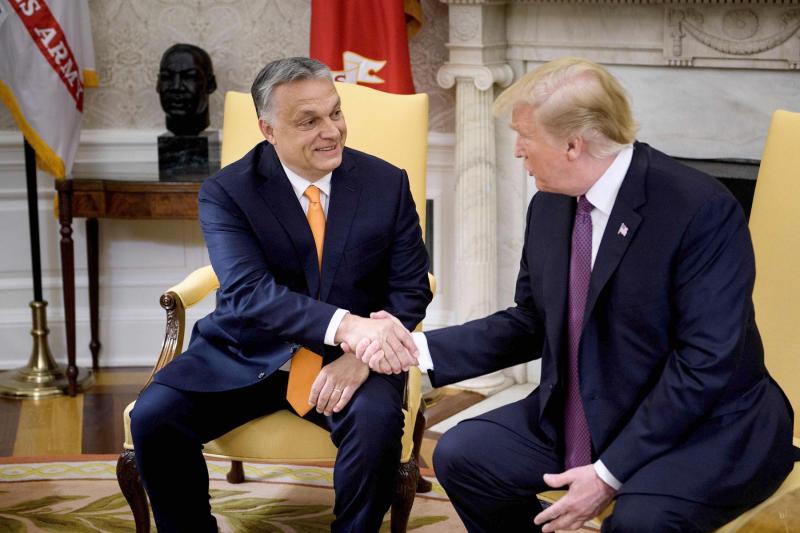A legitimating moment for European bigotry?

Ideologically aligned. Hungary’s Prime Minister Viktor Orban (L) and US President Donald Trump shake hands in the Oval Office of the White House, May 13. (AFP)
Opinion polls indicate a surge in support for the far right ahead of the elections, which could make it the second largest force in the European Parliament with up to 35% of all seats.
The legitimating moment for European bigotry occurred when Hungarian Prime Minister Viktor Orban was received by US President Donald Trump at the White House and given a fulsome endorsement. Orban, said Trump, is “respected all over Europe. Probably, like me, a little bit controversial but that’s OK.”
To find in Orban a mini-me counts as high praise from Trump. It’s also a pretty astute observation betraying profound self-awareness — something one might not have expected in Trump — but what did he mean by “controversial”?
It would be the following: A blood-and-soil nationalist leader who’s Islamophobic, anti-migrant, anti-Semitic, pro-Russia, pro-Putin and displays authoritarian tendencies as well as scant respect for rule of law, human rights, a free press and political opponents. Add to that a propensity to build border walls and enormous reliance on the relationship with Israeli Prime Minister Binyamin Netanyahu.
All of the above are true of Orban as well as Trump. Both men have roughly the same political modus operandi, one that plays to the inner bigot within a core base of voters. They trigger the bigot within by demonising Muslims and migrants. Both legitimise coded anti-Semitic language and tropes while strategically using the alignment with Netanyahu as proof no ill will is meant to the Jewish people.
Orban and Trump see the Western world’s future as wholly white and Christian and both present themselves as guardians of the faith. Consider Orban’s comment to French philosopher Bernard-Henri Levy in April: “I am the most Christian and thus the most European of Europeans. Europe’s DNA is me. I am its guardian.”
Both regard Muslims, Arabs and dark-skinned migrants as a form of contamination. In his conversation with Levy, Orban said that “Europe’s problem is Islam and on the rise of Islam, what can I say? It is Christianity that has resisted that rise. Christianity is still resisting it. Hungary is today, as it has been, the forward post of European Christianity.”
In January 2018, Orban told the German newspaper Bild he didn’t see asylum seekers from conflict-scarred Syria “as Muslim refugees. We see them as Muslim invaders.”
Does it matter that Orban and Trump rejoice in much the same toxic brand of politics? Attention is being consciously drawn to their twinning at a crucial moment. The European political year will turn when elections to the 751-seat European Parliament take place May 23-26 across the 28-country bloc.
Trump’s public backing for Orban may help the European far right’s prospects. The far right is doing battle with the centre right and centre-left groups that have dominated the European Parliament for 40 years.
Italy’s Matteo Salvini and France’s Marine Le Pen are working overtime to push their new European Alliance of People and Nations as the authentic face of politics in the European bloc. Other anti-immigration parties have signed up to their group, not least Germany’s Alternative for Germany, the Danish People’s Party and the Finns Party.
The European Parliament matters. Along with the European council of ministers — government members from all EU countries — MEPs approve, amend or reject EU laws. They must also approve the new European Commission.
Opinion polls indicate a surge in support for the far right ahead of the elections, which could make it the second largest force in the European Parliament with up to 35% of all seats. If so, there is likely to be a new continent-wide focus on security, immigration and “nation-first” economics even as the culture wars rage over the role of Islam in European societies.
Orban hitched his wagon to Trump even before Trump won the 2016 presidential election and was the only EU leader to endorse the former reality TV star’s campaign. Yet, it took more than two years for the Hungarian strongman to secure an invitation to Trump’s White House and a meeting May 13.
That it has happened now is a public relations prize, a peerless gift from Trump to a kindred spirit. It may affect European politics long after memories of the Orban-Trump lovefest have faded.

